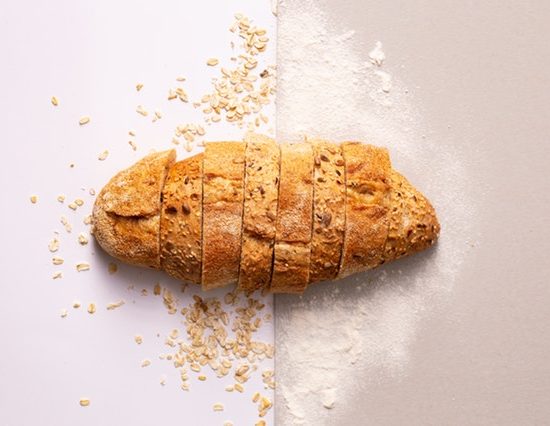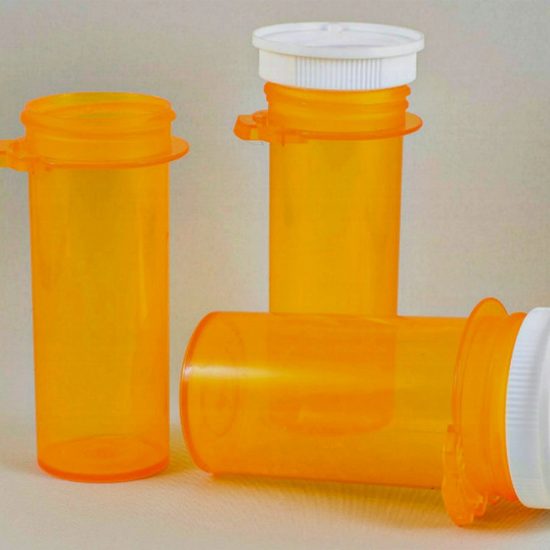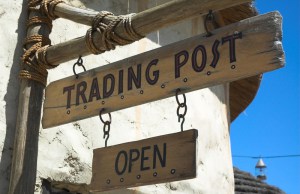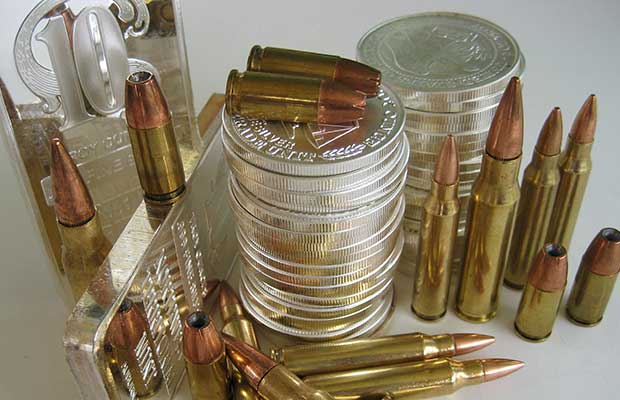
Because the topic has been discussed extensively, I had sworn off writing about investing in precious metals as part of a preparedness strategy. However, everything I see on the subject seems so flawed and misleading that I simply cannot resist the impulse to share some alternate (or perhaps less-biased) views on the subject.
It seems that everyone who is advocating metal investments starts their sales pitch with the claim that the investor should buy metals to protect the value of their assets from a dramatic decline in the value of the dollar (aka ‘inflation’). Eventually however, those same advocates close their pro-metal argument by predicting that the metal initially purchased for some number of dollars will ultimately be worth a great many more of those same dollars.
Surely I’m not the only person who sees the contradiction in measuring the success of an investment in terms of the very store of value that one has already called into question? Someone who truly believes that the value of the dollar will plunge should not, in their next breath, define the success of any investment in terms of those same dollars. To value things in terms of dollars is to worship at the altar of the dollar, and to lash one’s future to the mast of the sinking ship that all preppers seek to escape!
In this article I will provide a perspective on metals investing that is intended to enable the prepper to make the best possible decisions for their unique circumstances.
Why Metals?
Gold, silver and other metals are commodities, just as are oil, barrels of wheat and ‘pork bellies’. These other commodities could also be used as a store of value; however there are some important reasons that precious metals are most often preferred:
- Precious metals don’t degrade substantially over time.
- Metals are easier to transport – they pack a large amount of value into smaller space.
- Metals are ‘fungible’ – an ounce of bullion in one location can be exchanged for an ounce of the same bullion elsewhere with no change in value.
- Unlike agricultural products, the value of metals does not change with the weather or other transient phenomena.
These characteristics of metals have made them an attractive store of value since the dawn of civilization.
It’s All About V-A-L-U-E
If I were to offer to give you either a crisp, mint-condition twenty dollar bill or another old, weather-beaten twenty dollar bill that had been signed by Elvis Presley, which would you take? Virtually anyone would take the old, signed bill over the new one simply because there is the belief that the value of the signed bill is much greater than the value of the new one (you could get more “stuff” for the signed bill).
Wise investors don’t think in terms of the dollar value (aka “price”) of their assets nearly as much as they consider the real value, which may not be directly expressed in any quantitative way at all. For example, if you were to purchase a golf course in an city that a large golfing demographic is relocating into then you would simply know that the value of that investment is going to grow wildly, regardless of the value of the dollar or any other currency.
Ultimately it boils down to “what you can get for your investment”. If you could purchase 100,000 gallons of regular gasoline with the money you paid for that golf course, and two years later you could sell that golf course and use that money to purchase 500,000 gallons of the same fuel, then you would know that you had made a very good investment.
This principal of ‘true value’ also applies when evaluating the value of the stock market. There is a measure of the value of the stock market that is called the “DOW in gold dollars” (“DIG$”), which is basically a measure of the value of the DOW Joes industrial average as expressed in troy ounces of gold (a ‘troy ounce’ is a unit of weight that is very nearly 10% heavier than the more commonly used ‘avoirdupois ounce’ – for historical reasons precious metals are still measured in troy ounces.).
By considering value in terms of precious metals one completely takes the dollar (which has whatever arbitrary value the Federal Reserve decides to give it through control of the printing presses) out of your calculations. Just image how much clearer a picture that would provide you in terms of making ANY sort of medium- to long- term financial decision!
It should be noted that the value of metals is itself not constant. Theoretically someone might discover a mountain of silver somewhere which would cause the value of silver to plummet. However, throughout history the value of metals has been vastly more stable than the value of national currencies.
Metals For Post-Collapse Barter
During and after a major disaster it may be impossible to find anyone willing to sell tangible goods for any number of dollars, however it may be possible to, in many instances, trade precious metals for needed goods and services. Under those circumstances one should base one’s assessment of the value of their metals on their pre-disaster value. For example, if one ounce of silver bullion were selling today for $20, then it is roughly selling for the price of two good meals or 5 gallons of regular gas. During and after a major disaster one should expect the value of their metals to somewhat reflect those pre-disaster values. During the post-disaster recovery the value may grow to be substantially higher, while during the disaster itself the value may be reduced a bit to reflect the fact that “you can’t eat silver”.
SIDENOTE: When my oldest son graduated from college and relocated to the other side of the country I gave him several one-ounce silver rounds, with instructions that he should always equate each of those to one-third of a tank of gas, or to a good meal for himself and his girlfriend.
Metals as the Debtor’s Best Friend
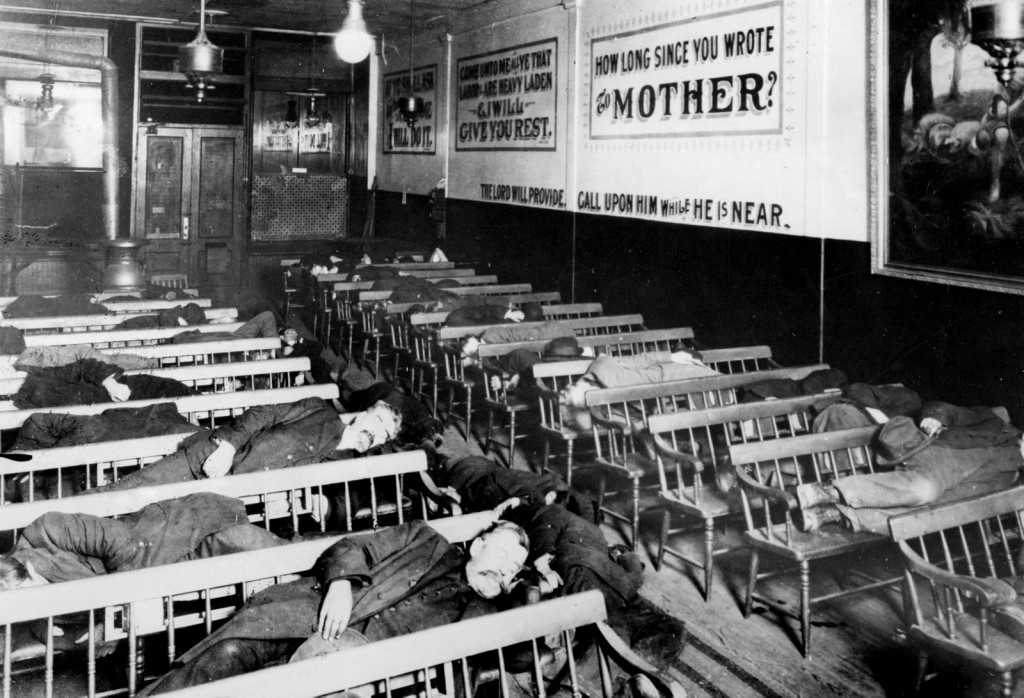
The paradox of precious metals – and one of the salient points that served as the impetus for this article – is that the most substantial advantage offered by metals accrues to those who are least able and likely to own them. In an inflationary environment (and particularly in the hyper-inflationary environment that many preppers anticipate) the dollar value of precious metals becomes very high while the dollar value of debts remains fixed (in other words, the amount you owe for debts remains unchanged). Imagine the case of someone purchasing a quality of metals for $1000 and having the dollar value of those metals increase to $100,000 – that individual might then sell those metals and use the cash from that sale to pay off a mortgage.
NOTE: During America’s Great Depression there were countless stories of families being evicted from their homes due to inability to pay their mortgage. In today’s world the possession of precious metals may be the critical factor in one being able to preserve one’s home.
Meanwhile, the multimillionaire who almost certainly had no debt gets the advantage of preserving the value of his or her holdings, but does not realize the much larger windfall of paying off debt with ‘cheaper dollars’ (assuming that the multimillionaire is debt-free).
This is yet another important reason that preppers should give consideration to owning physical metals. Perhaps, post-disaster, the dollar value of the metals does not increase sufficiently to pay off a mortgage; however it may very well enable the prepper to service that mortgage long enough for the economy to begin to recover.
Disadvantages of Metals
Holding precious metals is just one of many strategies that are available to the prepper. Money that could be invested into metals could also be invested into gaining new skills and knowledge that will be needed post-disaster. Unlike metals, skills and knowledge cannot be taken from you.
One very real risk that the prepper runs when investing in metals is a government confiscation similar to President Franklin Roosevelt’s Executive Order 6102, signed on May 1, 1933, that required all citizens holding more than 5 troy ounces of gold to sell their gold to the government (there were certain minor exemptions – for example for jewelers, dentists and sign-makers). In today’s dollars the fine for non-compliance with the law was over $180,000 and/or up to 10 years in prison!
There are many who claim that there would never be a return of gold confiscation due to protections that have been built into today’s modern economy. Perhaps these claims are accurate, but it is also not difficult to imagine metals being confiscated on principle alone, since “hoarding” of metals represents a lack of faith in ‘the system’ that ‘the system’ simply may not be willing to tolerate. Regardless, if those with metals are forced to sell them at market rates the metals will almost certainly have still increased dramatically in dollar value before that time, and the money derived from that sale could still be re-invested in other preps.
Another disadvantage of holding physical metals is the risk of theft. Laws have been passed that call into question the security of the contents of safe deposit boxes against seizure, and one must also question other 3rd parties that offer to store metals for the investor (particularly in the aftermath of a major disaster). These considerations cause many savvy investors to maintain physical possession of their metals, with some actually choosing to bury their metals underground for safe storage.
Yet another risk associated with investment in metals is that they become so popular that yet another ‘bubble’ (this time a ‘gold bubble’) develops in the economy. This could result in a dramatic drop in the value of metals. Most experts do not believe that at present we are experiencing any sort of gold bubble.
NOTE: My grandfather was the kindest, most sweet and gentle man that I ever knew. I never knew him to utter a harsh word about anyone … with the notable exception of President Franklin Roosevelt. I believe the only time I ever heard him use swear words was with regard to President Roosevelt’s confiscation of gold.
Conclusion
Storing the value of one’s money in the form of precious metals is almost certainly a good way to protect its value from the ravages of (politician-controlled) inflation. If one happens to have a significant amount of debt, the potential to later sell those metals and use the resulting cash to retire those debts is quite compelling. There are other preparedness needs that should be addressed before any prepper should consider investing in metals (e.g. food, water, shelter and defense). Once these fundamental needs have been satisfied, however, a judicious investment in precious metals could make a big difference in quality of life in the medium- to long- term following a major disaster.
















